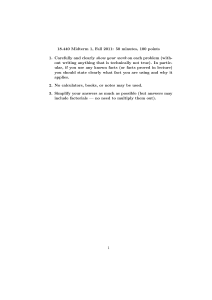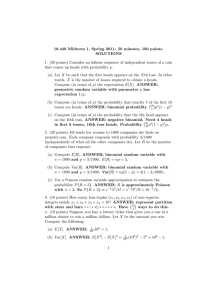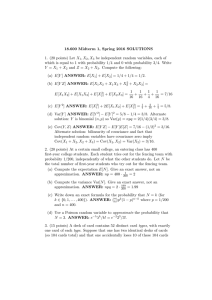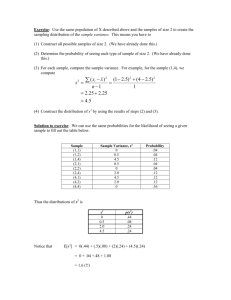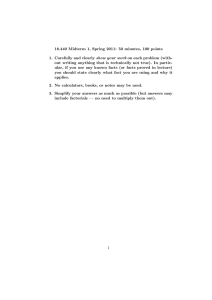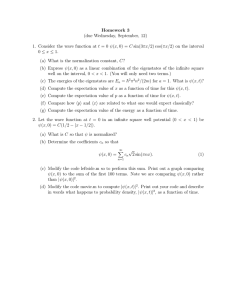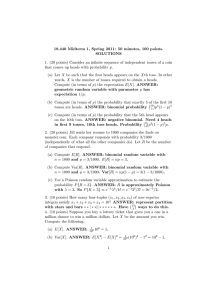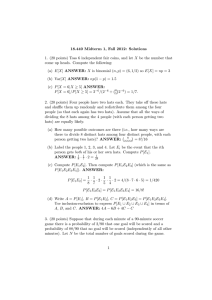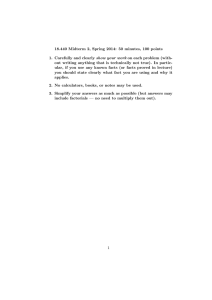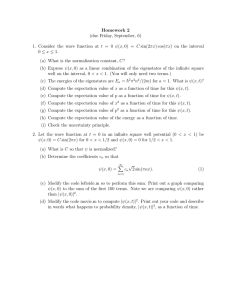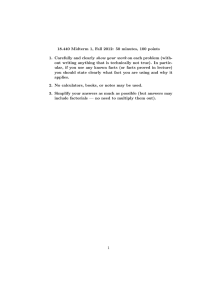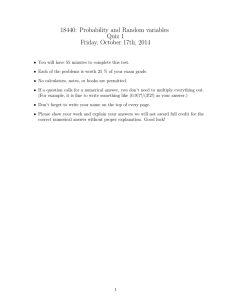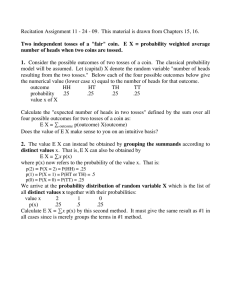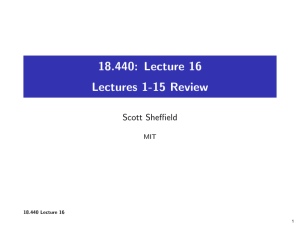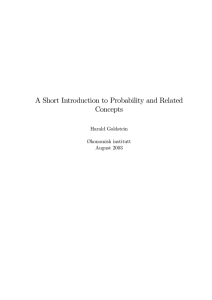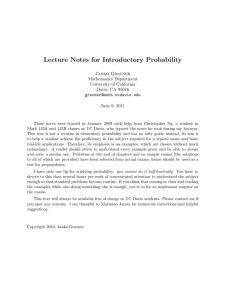18.440 Midterm 1 Solutions, Fall 2011: 50 minutes, 100 points
advertisement
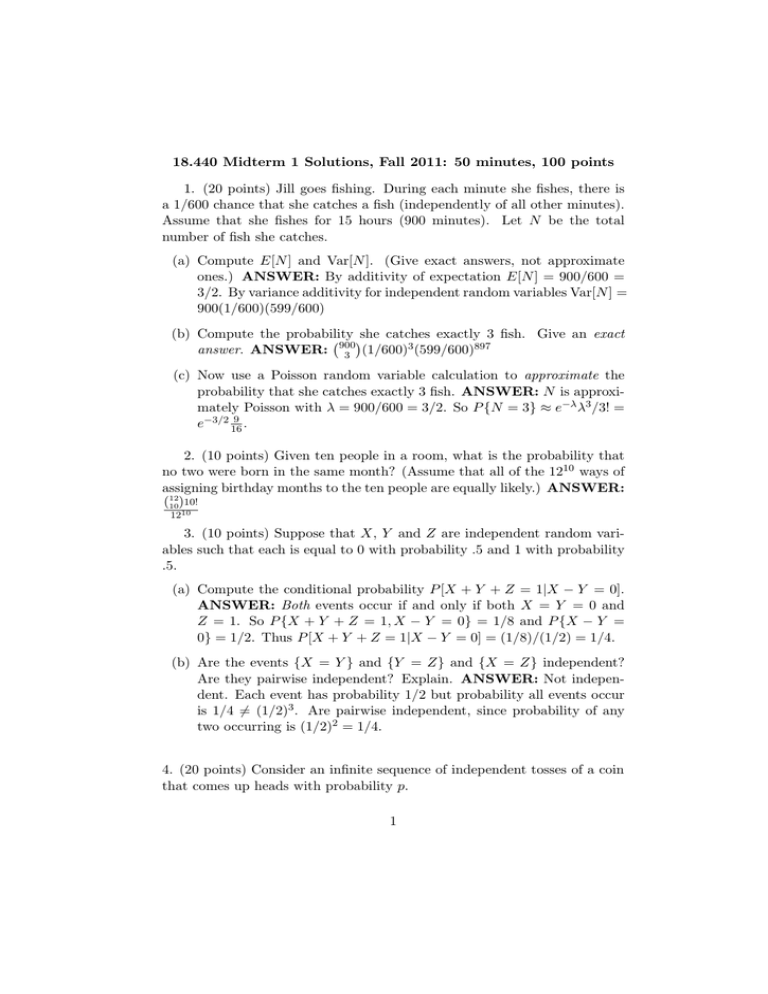
18.440 Midterm 1 Solutions, Fall 2011: 50 minutes, 100 points
1. (20 points) Jill goes fishing. During each minute she fishes, there is
a 1/600 chance that she catches a fish (independently of all other minutes).
Assume that she fishes for 15 hours (900 minutes). Let N be the total
number of fish she catches.
(a) Compute E[N ] and Var[N ]. (Give exact answers, not approximate
ones.) ANSWER: By additivity of expectation E[N ] = 900/600 =
3/2. By variance additivity for independent random variables Var[N ] =
900(1/600)(599/600)
(b) Compute the probability she catches exactly 3 fish. Give an exact
3
897
answer. ANSWER: 900
3 (1/600) (599/600)
(c) Now use a Poisson random variable calculation to approximate the
probability that she catches exactly 3 fish. ANSWER: N is approxi3 /3! =
mately Poisson with = 900/600 = 3/2. So P {N = 3} ⇡ e
9
3/2
e
16 .
2. (10 points) Given ten people in a room, what is the probability that
no two were born in the same month? (Assume that all of the 1210 ways of
assigning birthday months to the ten people are equally likely.) ANSWER:
10!
(12
10)
1210
3. (10 points) Suppose that X, Y and Z are independent random variables such that each is equal to 0 with probability .5 and 1 with probability
.5.
(a) Compute the conditional probability P [X + Y + Z = 1|X Y = 0].
ANSWER: Both events occur if and only if both X = Y = 0 and
Z = 1. So P {X + Y + Z = 1, X Y = 0} = 1/8 and P {X Y =
0} = 1/2. Thus P [X + Y + Z = 1|X Y = 0] = (1/8)/(1/2) = 1/4.
(b) Are the events {X = Y } and {Y = Z} and {X = Z} independent?
Are they pairwise independent? Explain. ANSWER: Not independent. Each event has probability 1/2 but probability all events occur
is 1/4 6= (1/2)3 . Are pairwise independent, since probability of any
two occurring is (1/2)2 = 1/4.
4. (20 points) Consider an infinite sequence of independent tosses of a coin
that comes up heads with probability p.
1
(a) Let X be such that the first heads appears on the Xth toss. In other
words, X is the number of tosses required to obtain a heads.
Compute (in terms of p) the expectation
and variance of X.
P1
ANSWER: Recall or derive: P
E[X] = k=1 q k 1 pk, where q = 1 p.
k 1 p(k
Cute trick: write E[XP 1] = 1
1). Setting j = k 1,
k=1 q
1
j
1
we have E[X 1] = q j=0 q pj = qE[X]. Thus E[X] 1 = qE[X]
and solving for E[X] gives E[X] = 1/(1 q) = 1/p.
P
k 1 pk 2 . Cute trick:
Similarly, recallPor derive: E[X 2 ] = 1
k=1 q
1
2
k
1
2
E[(X 1) ] = P
p(k 1) . Setting j = k 1, we have
k=1 q
j 1 pj 2 = qE[X 2 ]. Thus
E[(X 1)2 ] = q 1
q
j=0
E[(X 1)2 ] = E[X 2 2X + 1] = E[X 2 ] 2/p + 1 = qE[X 2 ]. Solving
for E[X 2 ] gives (1 q)E[X 2 ] = pE[X 2 ] = 2/p 1, so
E[X 2 ] = (2 p)/p2 and Var[X] = 1p2p .
(b) Let Y be such that the fifth heads appears on the Y th toss. Compute
(in terms of p) the expectation and variance of Y . ANSWER: By
additivity of expectation and variance (for independent random
variables) we obtain E[Y ] = 5/p and Var[Y ] = 5(1 p)/p2 .
5. (20 points) Suppose that X is continuous
random variable with
(
x
e
x>0
probability density function fX (x) =
. Compute the
0
x<0
following:
(a) The expectation
E[X]. ANSWER:
R1
R1
E[X] = 1 xfX (x)dx = 0 e x xdx = 1.
(b) The probability P {XR 2 [ 50, 50]}. ANSWER:
R 50
50
P {X 2 [ 50, 50]} = 50 fX (x)dx = 0 e x dx = 1
e
50
(c) The cumulative distribution
( function FX . ANSWER:
Ra
0
a0
FX (a) = 1 fX (x)dx = R a x
a
e
a>0
0 e dx = 1
6. (20 points) A group of 52 people (labeled 1, 2, 3, . . . , 52) toss their hats
into a box, mix them up, and return one hat to each person (all 52!
permutations equally likely). Compute the following:
(a) The probability that the first 26 people all get their own hats.
1 1
1
26!
ANSWER: 52
51 . . . 27 = 52!
2
(b) The probability that there are 26 pairs of people whose hats are
switched: i.e., each pair can be labeled (a, b), such that a got b’s hat
52
and b got a’s hat. ANSWER: Have 2,2,2,...,2
= 52!/(226 ) ways to
choose ordered list of 26 pairs. Dividing by 26! gives number of
52!
unordered collections of pairs. So we get 226
permutations of
26!
desired type. Dividing by 52! gives probability 226126! .
3
